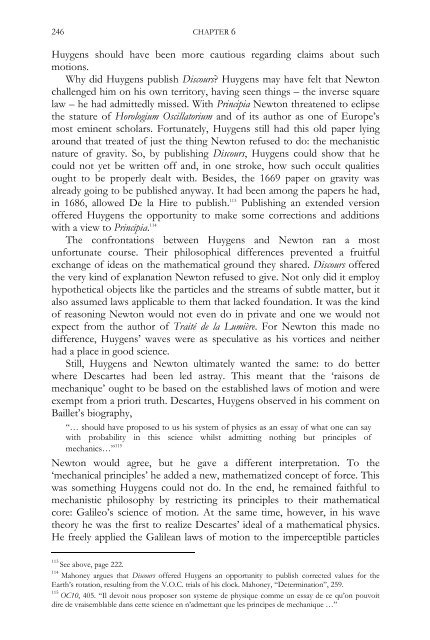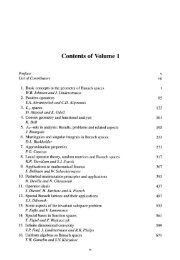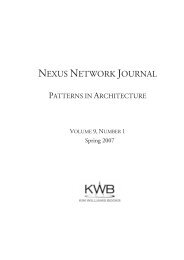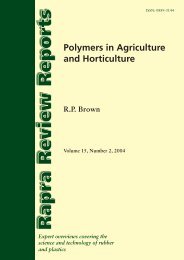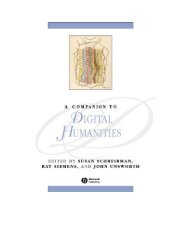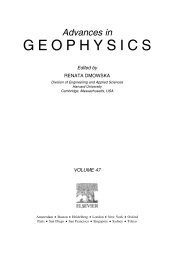Lenses and Waves
Lenses and Waves
Lenses and Waves
You also want an ePaper? Increase the reach of your titles
YUMPU automatically turns print PDFs into web optimized ePapers that Google loves.
246 CHAPTER 6<br />
Huygens should have been more cautious regarding claims about such<br />
motions.<br />
Why did Huygens publish Discours? Huygens may have felt that Newton<br />
challenged him on his own territory, having seen things – the inverse square<br />
law – he had admittedly missed. With Principia Newton threatened to eclipse<br />
the stature of Horologium Oscillatorium <strong>and</strong> of its author as one of Europe’s<br />
most eminent scholars. Fortunately, Huygens still had this old paper lying<br />
around that treated of just the thing Newton refused to do: the mechanistic<br />
nature of gravity. So, by publishing Discours, Huygens could show that he<br />
could not yet be written off <strong>and</strong>, in one stroke, how such occult qualities<br />
ought to be properly dealt with. Besides, the 1669 paper on gravity was<br />
already going to be published anyway. It had been among the papers he had,<br />
in 1686, allowed De la Hire to publish. 113 Publishing an extended version<br />
offered Huygens the opportunity to make some corrections <strong>and</strong> additions<br />
with a view to Principia. 114<br />
The confrontations between Huygens <strong>and</strong> Newton ran a most<br />
unfortunate course. Their philosophical differences prevented a fruitful<br />
exchange of ideas on the mathematical ground they shared. Discours offered<br />
the very kind of explanation Newton refused to give. Not only did it employ<br />
hypothetical objects like the particles <strong>and</strong> the streams of subtle matter, but it<br />
also assumed laws applicable to them that lacked foundation. It was the kind<br />
of reasoning Newton would not even do in private <strong>and</strong> one we would not<br />
expect from the author of Traité de la Lumière. For Newton this made no<br />
difference, Huygens’ waves were as speculative as his vortices <strong>and</strong> neither<br />
had a place in good science.<br />
Still, Huygens <strong>and</strong> Newton ultimately wanted the same: to do better<br />
where Descartes had been led astray. This meant that the ‘raisons de<br />
mechanique’ ought to be based on the established laws of motion <strong>and</strong> were<br />
exempt from a priori truth. Descartes, Huygens observed in his comment on<br />
Baillet’s biography,<br />
“… should have proposed to us his system of physics as an essay of what one can say<br />
with probability in this science whilst admitting nothing but principles of<br />
mechanics…” 115<br />
Newton would agree, but he gave a different interpretation. To the<br />
‘mechanical principles’ he added a new, mathematized concept of force. This<br />
was something Huygens could not do. In the end, he remained faithful to<br />
mechanistic philosophy by restricting its principles to their mathematical<br />
core: Galileo’s science of motion. At the same time, however, in his wave<br />
theory he was the first to realize Descartes’ ideal of a mathematical physics.<br />
He freely applied the Galilean laws of motion to the imperceptible particles<br />
113 See above, page 222.<br />
114 Mahoney argues that Discours offered Huygens an opportunity to publish corrected values for the<br />
Earth’s rotation, resulting from the V.O.C. trials of his clock. Mahoney, “Determination”, 259.<br />
115 OC10, 405. “Il devoit nous proposer son systeme de physique comme un essay de ce qu’on pouvoit<br />
dire de vraisemblable dans cette science en n’admettant que les principes de mechanique …”


